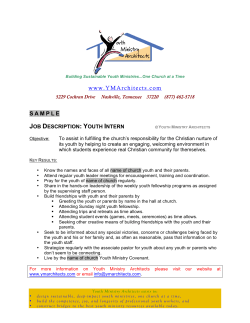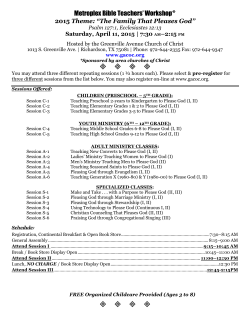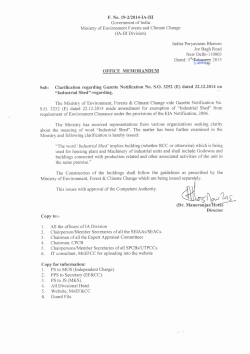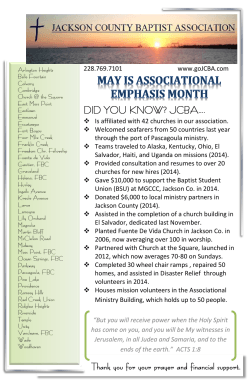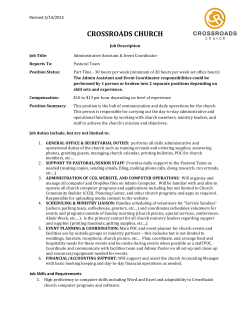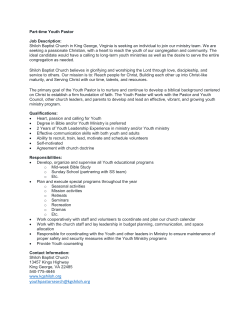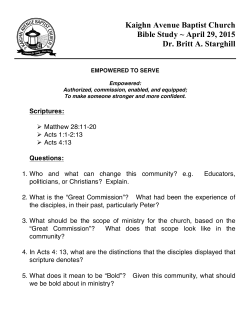
Attachment - Ministry of Communications and Information
Ministry of Communication and Information Technology (MCIT) Islamic Republic of Afghanistan Request for “Expressions of Interest” for Individual Consultant Consultancy Services: Chief Information Officer Project: E-Government Resource Center Position: Chief Information Officer (CIO) Number of Positions: 10 Contract Type: Services Contract (Advisory Services) Duration: Closing Date: Duty Station: 12 Months (Possibility of Extension) Jun, 20th 2015 Kabul Background MCIT would establish An E-Government Resource Centre (EGRC-II) in the premises of MCIT to be the center of excellence in E-Government in the country and to be the source of technical expertise and skills, advice and guidance for development and deployment of E-Government in the agencies and departments of the GIRoA. The proposed E-Government Resource Centre will assist in the development of National E-Government Information Management and Data Standards and policies within the framework of the already developed e-GIF (E-Gov Interoperability Framework) and e-Government Strategic Master Plan. The proposed center will provide guidance, advice and technical expertise to GIRoA for design and development of the E-Government program as a whole and for specific projects within it. The Centre will also provide services to donor supported projects and other agencies of the government at the central and provincial levels in the development and deployment of ICT for governance and development including training and capacity building in the agencies and in the development and implementation of E-Government projects in various application areas. As it is apparent that huge number of projects are being designed and implemented by donor organizations directly, which include the ICT module in it, the EGRC will have a unit tasked to monitor such projects by liaising with donor organization and also monitoring their websites and bilateral agreements with the Ministry of Finance of GIRoA. EGRC will also deploy CIOs in 10 Ministries for the first phase of the project, which will report on the ICT deployments in these organizations on time to time bases; this will insure the implementation of common ICT policies and platforms throughout the government sector. MCIT will arrange MoUs with donor organizations, which will enable the EGRC to carry forward the coordination tasks in this area. Services to be rendered by the proposed E-Government Resource Centre can be classified into the following major categories: 1. 2. 3. 4. E-Government Consulting and Advisory Services E- Government Human Resource Capacity Development E-GIF Implementation and IT standardization Services IT and e-Gov Audit Objective: The Ministry of Communications and IT is the core body to promote, design, implement and adopt ICT in the country. In order to establish the basis for Government Wide Information Technology (GWIT) leadership and decision-making, EGRC will establish the CIO culture within the government. The Chief Information Officer’s role is to provide vision and leadership for developing and implementing information technology initiatives that align with the mission of focus. The Chief Information Officers using between MCIT and Line ministry (1)Ministry of Foreign Affairs, (2) Ministry of Interior, (3) Ministry of Finance,(4) Ministry of Commerce and Industry, (5) Ministry of Education, (6) Ministry of Information, Culture & Tourism, (7) Ministry of Agriculture, Irrigation and Live stock, (8) Ministry of Higher Education, (9) Ministry of Public Health and (10) Civil Service Commission. CIO,s is ensure the implementation of MCIT policies and strategies. Deploy standardized PC/Work Station operating environments Develop ministry-wide Information Security policies and guidelines. Develop plans for Centralized Data Center operations and Hosting of applications Develop a CIO Handbook and conduct CIO Training Scope of Work CIO’s supporting Government Wide Information Technology (GWIT) are needed at the National and Ministerial Level The National CIO will align Government Wide Information Technology (GWIT) strategies to meet national socio-economic goals: Oversee Return on Investment (ROI) Provide leadership to streamline processes, develop standards and identify common applications Develop and implement citizen programs by supporting an e-Government infrastructure Enhance skills and training opportunities for constituents and in turn create jobs Show transparency, modernity, and bestow credibility to international community Develop private sector and vendor relationships The Ministerial CIO will align GWIT(Government Wide Information Technology) strategies to improve inter/intra ministerial operations: Implement National CIO Programs, GWIT (Government Wide Information Technology) policy and standards Increase efficiencies, productivity, and government transparency Implement e-Government and improve service to constituents Manage (Return on Investment) ROI Develop human resources to increase government capabilities . Detailed tasks include: Create CIO Strategic Plan for their own organization with the coordination of MCIT strategic plans. Assess and update or establish the legal structure for a National and Ministerial CIO Program that empowers the CIO to execute responsibilities Align policy and procedures to support the legal structure Identify areas where process change should be implemented Define the foundation (IT Organization & Process) for GWIT Management Implement processes so that IT resources are applied in a way that is well-aligned with overall government strategy Manage GWIT (Government Wide Information Technology) expenditures and eliminate duplication of systems, data, and effort Establish budgets and execution methods to assure proper use of government funds Assure new legal, policy, and procedural efforts support a service oriented model aimed at constituents Establish e-Gov efforts for broad socio-economic development objectives Use e-Gov to build trust between governments and citizens Introduce innovation in public services Increase efficiency and transparency of government for business transactions Conduct IT transformation and change impact assessment Map the assessment results to the desired “future state” Develop comprehensive, pragmatic actions to address people and organizational risks inherent in the CIO organization redesign Proactively identify and address the specific risks posed by the change Establish metrics and measurements to track success in the short and long term Focus on achieving current goals and objectives and sustaining future ROI (Return on Investment). Qualification and Skills Requirements Chief Information Officer should have the following qualifications and experience: Master Degree in Computer Science, Public Administration or Business Administration with at least 8 years or above of direct relevant work experience. Bachelor Degree in Computer Science with at least 10 years or above of direct relevant work experience. Fluency in Pashtu, Dari and English (reading, writing, speaking). High integrity and accountability, good team work spirit. Good knowledge of training and capacity building in Afghanistan content. Ability to draft clear and concise reports. Ability to work in new technological environment Ability to develop any type of database based on modern technology concepts Demonstrated experience in public sector management. Demonstrated experience in effectively managing people and projects. A capacity to build relationships. Skills required maintaining confidentiality and secrecy. Sound knowledge of planning and prioritization. Good communication skills. Excellent technological skills. Expressions of interest and the latest CVs must be delivered or sent by e-mail to the addressees below, no later than 20th Jun, 2015. E- Government Recourses Center; Attn: HR Officer EGRC-II Project 15th floor, Ministry of Communications and IT (MCIT); Mohammad Jan Khan Watt; Kabul, Afghanistan Cell phone: +93 794403754; Email: hr.project@mcit.gov.af ; Web site: www.mcit.gov.af Copy to: 1) Abdul Mujeeb Mohmand; E – Government Director; Ministry of Communication and IT, I.R of Afghanistan ; Mohammad Jan Khan Watt, Kabul Afghanistan ; Email: m.mohmand@mcit.gov.af 2) Sayed Masoud Samim; Human Recourses Director; Ministry of Communication and IT, I.R of Afghanistan ; Mohammad Jan Khan Watt, Kabul Afghanistan ; Email: masood.samim@mcit.gov.af Any queries on the position may also be addressed to the above mentioned email addresses, latest 3 working days before the deadline for submission of applications.
© Copyright 2025



